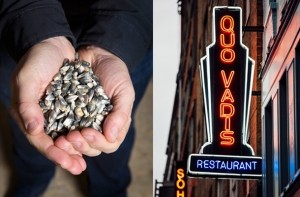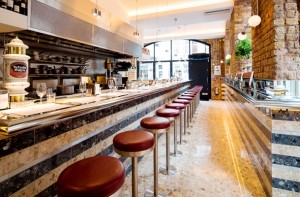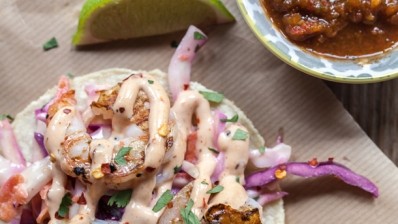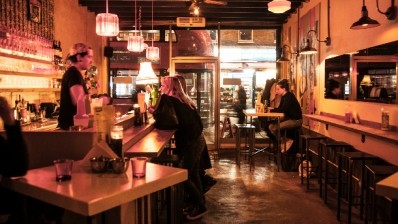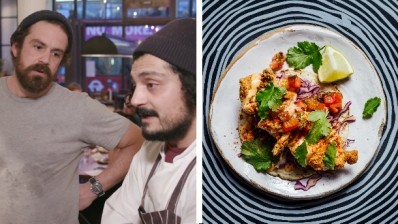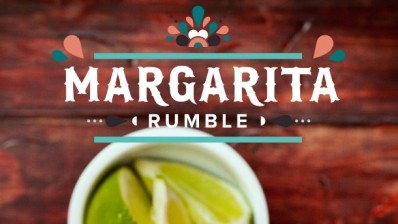Corn Stars: The Hart Group on new taco restaurant El Pastor

We’re sitting in the pub next door to El Pastor having just taken a tour of the site, which is located beneath a railway arch opposite Borough Market that used to house oyster restaurant Shuck. Sam is joined by university friend Crispin Somerville and younger brother James Hart, who has recently entered the restaurant business after a decade as a derivatives trader in the City. Eddie Hart, the brother with whom Sam runs landmark London restaurants Barrafina and Quo Vadis, is also involved with the taqueria project but is currently on a sabbatical.
It’s barely 11.30am but the gregarious trio is adamant that the fridge-like conditions at the new restaurant – it’s expected to open early this month but is still a building site – make alcohol the only viable option. Sam is sipping on a pint of Guinness, Somerville has a can of craft beer and a Bloody Mary is James’ drink of choice. While the latter may have only stepped into the family business six months ago, it’s clear that the apple hasn’t fallen too far from the tree when he graciously offers to make the cocktail himself after the barmaid admits she’s not too sure on the recipe.
Somerville has a weird and wonderful background that includes being an MTV VJ, managing Lily Allen’s record label and – most pertinent to this project – running famed Mexico City nightclub El Comillo (The Fang) with Sam in the ’90s. What’s more, he was also creative director for Wahaca’s Day of the Dead festival. While he has previously been quoted comparing his role in the project to that of Bez’s in the Happy Mondays, he shares the director title with Sam and James.
“We ate several times our body weight in tacos when we were in Mexico,” says Sam. “This project has been in the offing for many years and, to be completely honest, is driven by our desire to eat good tacos as much as anything else. But we’re also excited to be bringing proper tacos to London and serving them the way they do in Mexico. I’m not sure anyone else has done that yet. When they’re done right, tacos really are one of the best things to eat on the planet.”
The taco
Taco is a corn tortilla wrapped around food but the tortilla must not be thought of as a bland means of delivering other ingredients to the mouth. As with good pizza, the vehicle is as important as the filling, perhaps even more so.
“It’s just like making a great sandwich. The tortilla is key,” says Sam. This is where the shipment of corn comes in. El Pastor will be one of the few UK restaurants to transform raw corn into tortillas using a process called nixtamalization. This sees corn kernels boiled then steeped in water containing lime, which breaks down the proteins, greatly increases nutritional value and – importantly for tortillas – allows for the formation of a dough.
Nixtamalization was developed by the Aztecs and its power to unlock the goodness within Mesoamerica’s key crop has seen it reach mythical status.
“Our bodies can’t digest it,” says James. “The alkaline properties of the lime break down the proteins. Then we’re able to grind the corn in a special machine that produces a clay-like dough that can then be pressed into tacos.”
Nixtamalization is usually avoided on these shores with most Mexican restaurants ordering in pre-processed masa harina flour or simply buying in ready-made tortillas. It’s expensive, labour intensive and produces large volumes of alkalised water that restaurants aren’t usually allowed to dispose of themselves, although following negotiations with the environmental health officer, the El Pastor team has worked out a way to reduce PH levels to the point where the water can be put down the drain.
“We use lime that’s been fired in a kiln for several days, which removes some of its caustic properties,” adds James, plucking from his pocket a fist-sized rock of it to show me. “It’s a lot of work but doing it the proper way has an enormous impact on quality. It’s the difference between industrially produced sliced white bread and artisanal sourdough.”
There’s also a philanthropic angle to importing the raw product from Mexico, because what’s currently crossing the Atlantic isn’t any old corn. “There’s a big problem in Mexico,” Somerville explains. “Transgenic corn is threatening the livelihoods of those that farm corn on a small scale and pushing many indigenous strains close to extinction. Transgenic corn is an industrial product. It is more robust, has a better yield and is more profitable to farm despite it commanding a lower per kilo price. International markets can play a big role in protecting the future of indigenous varieties and those that farm it. It also happens to be an absolutely amazing artisanal product and worlds away from GM corn.”
The El Pastor name
El Pastor takes its name from Mexico City's famed Taco Al Pastor (in the style of the shepherd). Arriving in Mexico early last century, this taco is a direct descendant of the Middle Eastern shawarma. They were originally made with lamb – hence the name – but Mexico City chefs soon switched to pork, far and away the country’s most popular and widely available meat, and replaced the wheat-based flatbread with a corn tortilla.
El Pastor will follow the traditional recipe. Belly and shoulder is marinated overnight in four types of chillies, pineapple vinegar, green herbs, onion and achiote (an orangey-red food colouring with a peppery taste). The meat will then be cooked on a vertical rotisserie that’s indistinguishable from those found in kebab shops and sliced to order. The tacos will be topped with coriander, finely diced onion and pineapple.
While tradition dictates that tacos al pastor are served ready to eat, some of the other tacos at El Pastor will be served ungarnished.
According to the trio, a big part of the taco-eating experience that has been lost in translation on these shores is customisation. Here, tacos arrive as the finished article, but in Mexico they’re normally a DIY affair with most varieties requiring the eater to select their own salsa and add garnishes such as chopped coriander and white onions according to their own preferences.
“There’s been too much spoon feeding,” says Sam. “Nobody here has quite got their heads around simply leaving people to get on with it. I suppose restaurateurs are worried people won’t know what to do.”
“Customisation is central to the taco experience,” interjects Somerville. “In Mexico people instinctively know what goes with what, although people are never judged for experimenting. Allowing diners to control how they have their tacos will make the experience unpretentious and convivial.”
Other tacos available will include carnitas – pulled pork shoulder cooked in lard, water and spices that is served with optional pork skin – beef short rib and crispy chicken. Non-meat options will take in aqua chilli – a Mexican ceviche often made with prawn and scallops – that will be served on baked tortillas (tostadas) and vegetarian tacos, including one likely made with wild mushrooms and Oaxaca cheese; and another with roasted squash and sour cream.
The tacos will be served with three core salsas – salsa verde, pico de gallo (made with tomato, onion, coriander leaves, Serrano chilli and lime) and salsa morita (smoked jalapeño and tomatillo) – with hotter ones available on request.
To say the taco is an important part of Mexican food culture is a gross understatement. It is by far the county’s most popular menu item and Mexicans eat them so often that the phrase ‘echarse un taco’ (to grab a taco) is now synonymous with eating in general.
The trio erupts into good-natured panto-style booing and hissing when I draw parallels between their product and the burrito and attempt to explore why this highly customisable, carb-heavy menu item has taken off in a much bigger way than the taco has in the UK.
“The burrito as it is over here is Tex Mex,” says Somerville. “It’s come from the States and is entirely disconnected from Mexico and tacos.”
“They’re also made from flour tortillas, which keep very well,” adds Sam. “In contrast, corn tortillas must be very fresh. The fact that north America and the UK are big producers of wheat has something to do with it too.”
Menu
Needless to say, there won’t be any burritos on the menu at El Pastor. Tacos, tostadas and totopos (fried tortilla triangles) are supported by a small cast of sides that strike a balance between well-known Mexican preparations such as guacamole, quesadillas and esquites and less familiar items, including two that aren’t quite what they sound. Chicharron de queso takes its name from the famous pork scratching-like dish but, rather than pig, it’s cheese that’s grated then cooked on a plancha before being rolled up into a big crisp. Soupe de tortilla, meanwhile, is a vibrant tomato soup topped with crispy tortillas and served with avocado, sour cream and chillies.
El Pastor will be the most egalitarian restaurant the Hart Group has opened with its eponymous taco priced at £2.50. “It’s very difficult to judge how people are going to use this restaurant, which makes predicting spend per head tricky,” says Sam, who confesses that while in Mexico he was able to put away 10 tacos al pastor in one sitting. “If you came and had a beer, some tacos, a side and a sweet you’d be out for £20 to £25. However, if you get stuck into the upper end of our mezcal list and made a night of it, things would be different.
“But Mexican food and ingredients aren’t meant to be expensive. We’re not trying to make it fancy. It’s very far from being an ingredients-based restaurant like Barrafina, which sells carabineros prawns and jamon.”
That said, one of the trio’s principle challenges is ingredients that cost next to nothing in Mexico are quite expensive in the UK.
“Lime and chillies are all in excess of £14 a kilo and imported tomatillos costs more than the finest UK-produced heritage tomatoes,” says James. “We’re not currently buying these items in large enough volumes to drive the price down ourselves so there’s had to be some menu engineering to ensure we can be generous with the free sauces without sending the price of the tacos rocketing.”
The design of the space encourages a quick, in and out eating experience with roughly half the restaurant – some 36 covers – requiring diners to stand up (although there will be something to lean on and eat off). It’s a radical move, but then so was the decision to not take reservations at Barrafina when it opened almost 10 years ago. The brothers’ gamble ultimately paid off and arguably kick started a step change in the way restaurants are run.
Format
While El Pastor is unlikely to start a trend for standing room-only places, it would be unwise to bet against the Harts. As a set-up, it echoes taqueria and taco stand culture in Mexico as well as the Borough market crowd’s willingness to eat and drink upstanding.
It almost goes without saying that El Pastor won’t take bookings, but the system will be different to that of Barrafina, where guests are required to wait for their table within or outside the restaurant. Instead, it will use queue management system Qudini, which alerts customers by text message when their table is ready, so good news for the pub we’re currently sitting in.
There will be 24 regular covers, a communal table that seats eight and a bar with five stools. Accessed via a roll-up shutter, the space has an urban, industrial look that is a far cry from The Hart Group’s previous outings. The walls are mainly made up of exposed original brickwork but some areas are clad in corrugated metal and others in raw concrete. “It’s a synthesis of lots of different restaurants and taquerias in Mexico City,” says Somerville. “There will be no nacho libre masks or Day of the Dead paraphernalia on the walls because you don’t see that in contemporary Mexican design. It’s a stripped-back
industrial aesthetic. We can’t hide anything because Network Rail needs access to various parts of the restaurant to carry out maintenance.”
The drinks list will focus on mezcal, a cousin of tequila that’s usually produced on a small scale with agave that’s been slowly smoked.
While the selection includes some pricier options, entry level prices will be approachable with mezcalitas and margaritas – either served from a slushy machine or on the rocks – on at £6.50. The house beer will be Pacifico and the wine list will be minimal, reflecting the fact that tacos are rarely partnered with wine in Mexico.
The kitchen will be lead by Polish head chef Tomasz ‘Tomek’ Baranski, the former head chef of Barrafina Frith Street who has spent the past month learning the ropes at Mexico City taco restaurant El Farolito. He will be supported by former The Clove Club chef Nick Fitzgerald, who is half Spanish and half Irish but has a strong connection with Mexico having spent time travelling around the country (he also did a stage at Mexico City restaurant Pujol last year, which appears on the World’s 50 Best Restaurants list).
It’s actually a broadly similar situation to the early days of Fino – the brothers’ first foray into Spanish food that is now closed – where a young Nieves Barragán Mohacho reported to Frenchman Jean-Philippe Patruno. “Much like Nick, Nieves wasn’t ready to be head chef but she was able to support the head chef with her cultural knowledge.”
Barragán Mohacho isn’t formally involved with El Pastor but the trio hint that she may yet sprinkle a bit of her Michelin-starred magic on it. “She came out on one of our study tours. Her involvement is almost inevitable as she’s great friends with Tomac.”
With three Barrafinas and counting, the Hart Group is not afraid of expansion. If El Pastor is a success, more will follow. The model is relatively easy to replicate and with Mexican food a current buzzword expansion looks inevitable. If El Pastor can do for Mexican food in London what Barrafina did for Spanish, this month could see the arrival of one of the most important restaurants in the capital for some time.
